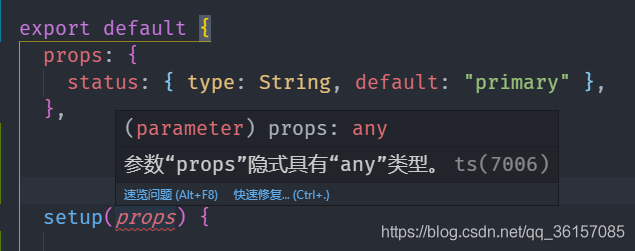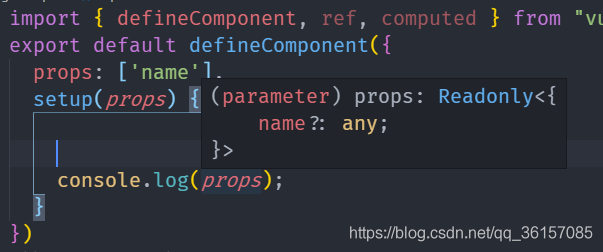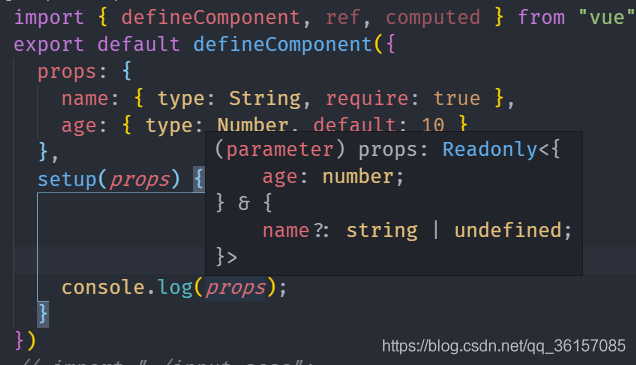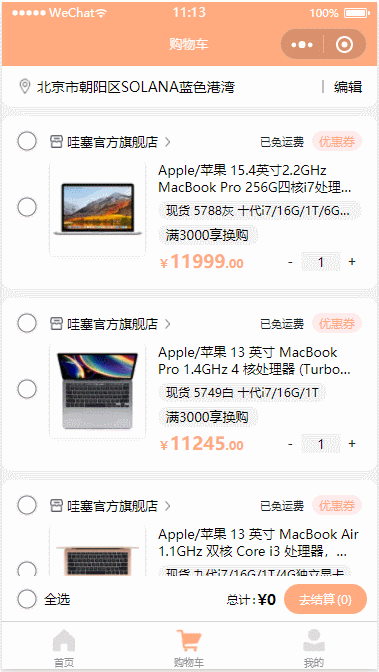目录
- defineComponent重载函数
- 开发实践
defineComponent函数,只是对setup函数进行封装,返回options的对象;
export function defineComponent(options: unknown) {
return isFunction(options) ? { setup: options } : options
}
defineComponent最重要的是:在TypeScript下,给予了组件 正确的参数类型推断 。

defineComponent重载函数
1:direct setup function
// overload 1: direct setup function
// (uses user defined props interface)
export function defineComponent<Props, RawBindings = object>(
setup: (
props: Readonly<Props>,
ctx: SetupContext
) => RawBindings | RenderFunction
): DefineComponent<Props, RawBindings>

2:object format with no props
// overload 2: object format with no props
// (uses user defined props interface)
// return type is for Vetur and TSX support
export function defineComponent<
Props = {},
RawBindings = {},
D = {},
C extends ComputedOptions = {},
M extends MethodOptions = {},
Mixin extends ComponentOptionsMixin = ComponentOptionsMixin,
Extends extends ComponentOptionsMixin = ComponentOptionsMixin,
E extends EmitsOptions = EmitsOptions,
EE extends string = string
>(
options: ComponentOptionsWithoutProps<Props,RawBindings,D,C,M,Mixin,Extends,E,EE>
): DefineComponent<Props, RawBindings, D, C, M, Mixin, Extends, E, EE>

3:object format with array props declaration
// overload 3: object format with array props declaration
// props inferred as { [key in PropNames]?: any }
// return type is for Vetur and TSX support
export function defineComponent<
PropNames extends string,
RawBindings,
D,
C extends ComputedOptions = {},
M extends MethodOptions = {},
Mixin extends ComponentOptionsMixin = ComponentOptionsMixin,
Extends extends ComponentOptionsMixin = ComponentOptionsMixin,
E extends EmitsOptions = Record<string, any>,
EE extends string = string
>(
options: ComponentOptionsWithArrayProps<
PropNames,
RawBindings,...>
): DefineComponent<
Readonly<{ [key in PropNames]?: any }>,
RawBindings,...>

4: object format with object props declaration
// overload 4: object format with object props declaration
// see `ExtractPropTypes` in ./componentProps.ts
export function defineComponent<
// the Readonly constraint allows TS to treat the type of { required: true }
// as constant instead of boolean.
PropsOptions extends Readonly<ComponentPropsOptions>,
RawBindings,
D,
C extends ComputedOptions = {},
M extends MethodOptions = {},
Mixin extends ComponentOptionsMixin = ComponentOptionsMixin,
Extends extends ComponentOptionsMixin = ComponentOptionsMixin,
E extends EmitsOptions = Record<string, any>,
EE extends string = string
>(
options: ComponentOptionsWithObjectProps<
PropsOptions, RawBindings, D, C, M, Mixin, Extends, E, EE>
): DefineComponent<PropsOptions, RawBindings, D, C, M, Mixin, Extends, E, EE>

开发实践
除去单元测试中几种基本的用法,在以下的 ParentDialog 组件中,主要有这几个实际开发中要注意的点:
自定义组件和全局组件的写法
inject、ref 等的类型约束
setup 的写法和相应 h 的注入问题
tsx 中 v-model 和 scopedSlots 的写法
ParentDialog.vue
<script lang="tsx">
import { noop, trim } from 'lodash';
import {
inject, Ref, defineComponent, getCurrentInstance, ref
} from '@vue/composition-api';
import filters from '@/filters';
import CommonDialog from '@/components/CommonDialog';
import ChildTable, { getEmptyModelRow } from './ChildTable.vue';
export interface IParentDialog {
show: boolean;
specFn: (component_id: HostComponent['id']) => Promise<{ data: DictSpecs }>;
}
export default defineComponent<IParentDialog>({
// tsx 中自定义组件依然要注册
components: {
ChildTable
},
props: {
show: {
type: Boolean,
default: false
},
specFn: {
type: Function,
default: noop
}
},
// note: setup 须用箭头函数
setup: (props, context) => {
// 修正 tsx 中无法自动注入 'h' 函数的问题
// eslint-disable-next-line no-unused-vars
const h = getCurrentInstance()!.$createElement;
const { emit } = context;
const { specFn, show } = props;
// filter 的用法
const { withColon } = filters;
// inject 的用法
const pageType = inject<CompSpecType>('pageType', 'foo');
const dictComponents = inject<Ref<DictComp[]>>('dictComponents', ref([]));
// ref的类型约束
const dictSpecs = ref<DictSpecs>([]);
const loading = ref(false);
const _lookupSpecs = async (component_id: HostComponent['id']) => {
loading.value = true;
try {
const json = await specFn(component_id);
dictSpecs.value = json.data;
} finally {
loading.value = false;
}
};
const formdata = ref<Spec>({
component_id: '',
specs_id: '',
model: [getEmptyModelRow()]
});
const err1 = ref('');
const err2 = ref('');
const _doCheck = () => {
err1.value = '';
err2.value = '';
const { component_id, specs_id, model } = formdata.value;
if (!component_id) {
err1.value = '请选择部件';
return false;
}
for (let i = 0; i < model.length; i++) {
const { brand_id, data } = model[i];
if (!brand_id) {
err2.value = '请选择品牌';
return false;
}
if (
formdata.value.model.some(
(m, midx) => midx !== i && String(m.brand_id) === String(brand_id)
)
) {
err2.value = '品牌重复';
return false;
}
}
return true;
};
const onClose = () => {
emit('update:show', false);
};
const onSubmit = async () => {
const bool = _doCheck();
if (!bool) return;
const params = formdata.value;
emit('submit', params);
onClose();
};
// note: 在 tsx 中,element-ui 等全局注册的组件依然要用 kebab-case 形式 ????
return () => (
<CommonDialog
class="comp"
title="新建"
width="1000px"
labelCancel="取消"
labelSubmit="确定"
vLoading={loading.value}
show={show}
onClose={onClose}
onSubmit={onSubmit}
>
<el-form labelWidth="140px" class="create-page">
<el-form-item label={withColon('部件类型')} required={true} error={err1.value}>
<el-select
class="full-width"
model={{
value: formdata.value.component_id,
callback: (v: string) => {
formdata.value.component_id = v;
_lookupSpecs(v);
}
}}
>
{dictComponents.value.map((dictComp: DictComp) => (
<el-option key={dictComp.id} label={dictComp.component_name} value={dictComp.id} />
))}
</el-select>
</el-form-item>
{formdata.value.component_id ? (
<el-form-item labelWidth="0" label="" required={true} error={err2.value}>
<child-table
list={formdata.value.model}
onChange={(v: Spec['model']) => {
formdata.value.model = v;
}}
onError={(err: string) => {
err3.value = err;
}}
scopedSlots={{
default: (scope: any) => (
<p>{ scope.foo }</p>
)
}}
/>
</el-form-item>
) : null}
</el-form>
</CommonDialog>
);
}
});
</script>
<style lang="scss" scoped>
</style>
全文总结
- 引入 defineComponent() 以正确推断 setup() 组件的参数类型
- defineComponent 可以正确适配无 props、数组 props 等形式
- defineComponent 可以接受显式的自定义 props 接口或从属性验证对象中自动推断
- 在 tsx 中,element-ui 等全局注册的组件依然要用 kebab-case 形式
- 在 tsx 中,v-model 要用 model={ { value, callback }} 写法
- 在 tsx 中,scoped slots 要用 scopedSlots={ { foo: (scope) => () }} 写法
- defineComponent 并不适用于函数式组件,应使用 RenderContext 解决
到此这篇关于浅谈Vue3 defineComponent有什么作用的文章就介绍到这了,更多相关Vue3 defineComponent作用内容请搜索NICE源码以前的文章或继续浏览下面的相关文章希望大家以后多多支持NICE源码!











